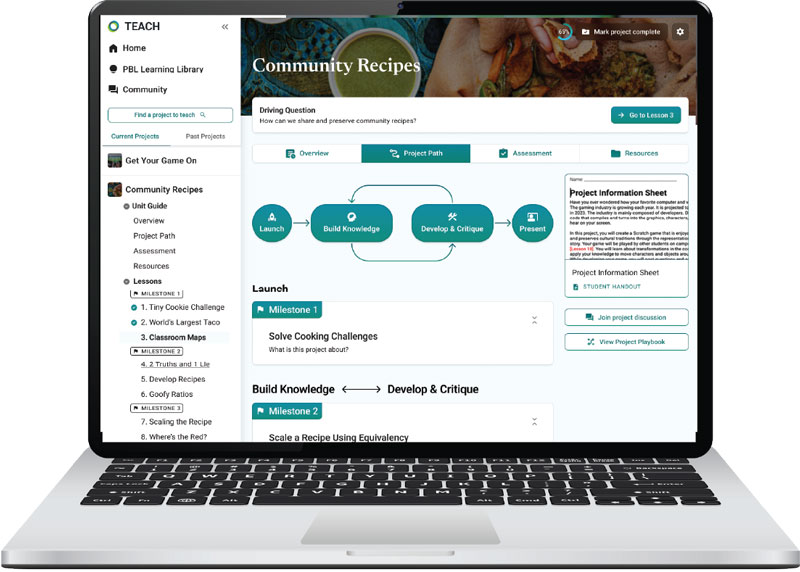PBLWorks Launches Web-based App to Help Scale Project-Based Learning
PBLWorks, the provider of professional development for project-based learning (PBL), has introduced PBLWorks TEACH, a web-based application that provides ready-to-use, standards-aligned PBL projects for middle school math, science, English language arts, and social studies.
Created by PBLWorks' experts, TEACH projects utilize the company's Gold Standard PBL framework, characterized by seven design elements: a challenging problem or question, sustained inquiry, authenticity, student voice and choice, reflection, critique and revision, and creating a public product. The materials also focus on teaching students real-world success skills such as critical thinking and collaboration, the company said in a news announcement.
PBLWorks offers the following example:
"In the 'Community Recipes' project for sixth grade math, students explore proportional reasoning by scaling family and community recipes. They investigate ratios, proportions, and unit rates using graphs, tables, and written descriptions. Along the way, they uncover and share meaningful stories behind each dish. The project culminates in a curated online food blog that highlights their recipes and the cultural connections behind them. Projects are broken down into lessons so teachers can easily align the content to their course calendar. Each lesson includes an outline and in-depth instructions and resources to help even novice teachers execute the project with ease."
The projects are designed to be accessible to all teachers, regardless of their experience with project-based learning, making it easier for schools to scale PBL initiatives, the company said.
 PBLWorks TEACH project path overview
PBLWorks TEACH project path overview
Other features of TEACH include:
- Project overviews show the standards each project addresses, with the project cadence matched to the length of time typically allotted to teach that particular standard.
- Step-by-step instructions guide teachers in implementing each project and outline learning goals for both content and success skills.
- Embedded professional learning,including videos with teaching tips and guidance for implementation.
- Communitiesprovide a forum for teachers to communicate with each other and with PBL experts.
- Course and assessment resources, including Google Slides, project information sheets, project supply lists, downloadable materials such as printable handouts, websites to share with students, rubrics, assignments, and performance-based assessments for measuring content mastery.
"We know first-hand how effective project-based learning is in supporting student success and we have nearly 30 years of experience training educators and administrators on how to design and implement Gold Standard PBL projects in their schools," said PBLWorks CEO Bob Lenz, in a statement. "We also realize that teachers have ever-increasing demands and significant time constraints, which can make designing their own projects a challenge. PBLWorks TEACH addresses this by providing teachers with everything they need to start using expert-designed, standards-aligned projects with their students."
TEACH is available as a school or district-level subscription, with middle school curriculum units currently available. Curriculum units for elementary and high school will be available early in 2026. For more information, visit the PBLWorks site.
About the Author
Rhea Kelly is editor in chief for Campus Technology, THE Journal, and Spaces4Learning. She can be reached at [email protected].